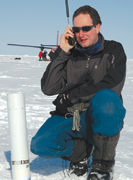Elizabeth Howell
Military snowmobiles travel across Canada’s icy north every year as a tangible reminder of Canada’s claim on the remote lands and islands near the North Pole. This year, a new group will tag along: the University of Ottawa’s Luke Copland will lead a two-week scientific expedition in April to observe the ice shelves on Ellesmere Island as part of International Polar Year. The trip is significant because of the unique partnership with the Canadian Forces. This will allow Copland’s team to reach areas that they could not gain access to or study.

“It’s extremely tough to get to that area because it’s so remote, and far away from conventional airfields or towns. We’re grateful that the military accepted our request to go,” says Copland, an assistant professor in the Department of Geography.
“The purpose of the patrols is to monitor the north and lay claim to the land, but more and more, the military wants to understand the changes that are happening up there. Climate change is melting away the ice shelves, but we won’t know how rapidly until we can measure them on-site.”
A total of 32 Canadian Rangers, military personnel and scientists will leave the remote weather station of Eureka on March 31 to explore the northern coastline of Ellesmere Island. They will be supported by dozens of military personnel from Joint Task Force North, including a fleet of ski-equipped Twin Otter aircraft from the military’s 440 (Transport) Squadron, based out of Yellowknife, NWT.
Copland’s small team will go to the northwestern tip of Ellesmere Island, where ice has gradually grown out from the land to form floating ice shelves on the ocean.
This ice has been there for at least 3,000 or 4,000 years, but the increasingly warmer water and air have shrunk it in the past century. Just 100 years ago, the shelves covered 10,000 square kilometres. Today, they are about a tenth of that size.
“The summers are now only one or two degrees hotter than a century ago, but it’s the winters where we see a big difference. They’re now four or five degrees warmer. This means the ice does not have time to build up during the winter, as it used to,” says Copland. “That’s a big reason as to why we see the ice losses.”
Copland and his team will take measurements of the five remaining ice shelves in that area; a sixth shelf, called Ayles, broke away in August 2005 to form a new ice island about the size of Manhattan. With help from the Canadian Ice Service last summer, Copland tagged this island with a satellite tracking beacon. He has found that the news Ayles Ice Island has already floated about 500 km to the southwest from where it broke off.
Tracking these changes is part of the impetus for Copland to travel north. He adds, “Travelling with the Rangers will teach us a lot more about the land because we’ll be travelling with local Rangers who have spent their whole lives there. And we’ll get to make measurements in places where science has never been before.”
Photo caption: Well-versed in glaciology, Luke Copland will be teaching a uOttawa glaciology class in Antarctica in February 2009 with Students on Ice. This award-winning organization offers unique learning expeditions to the Antarctic and the Arctic.